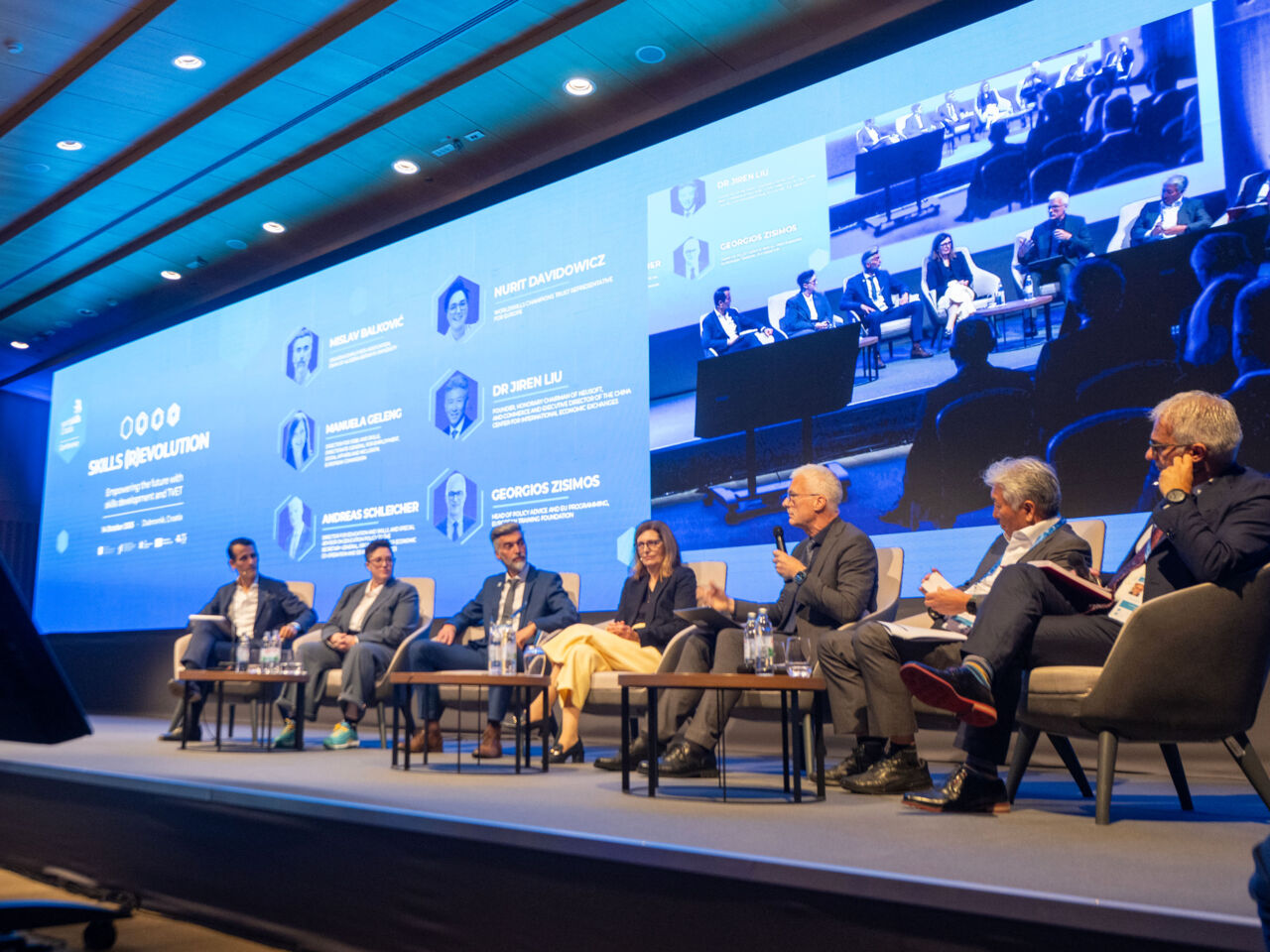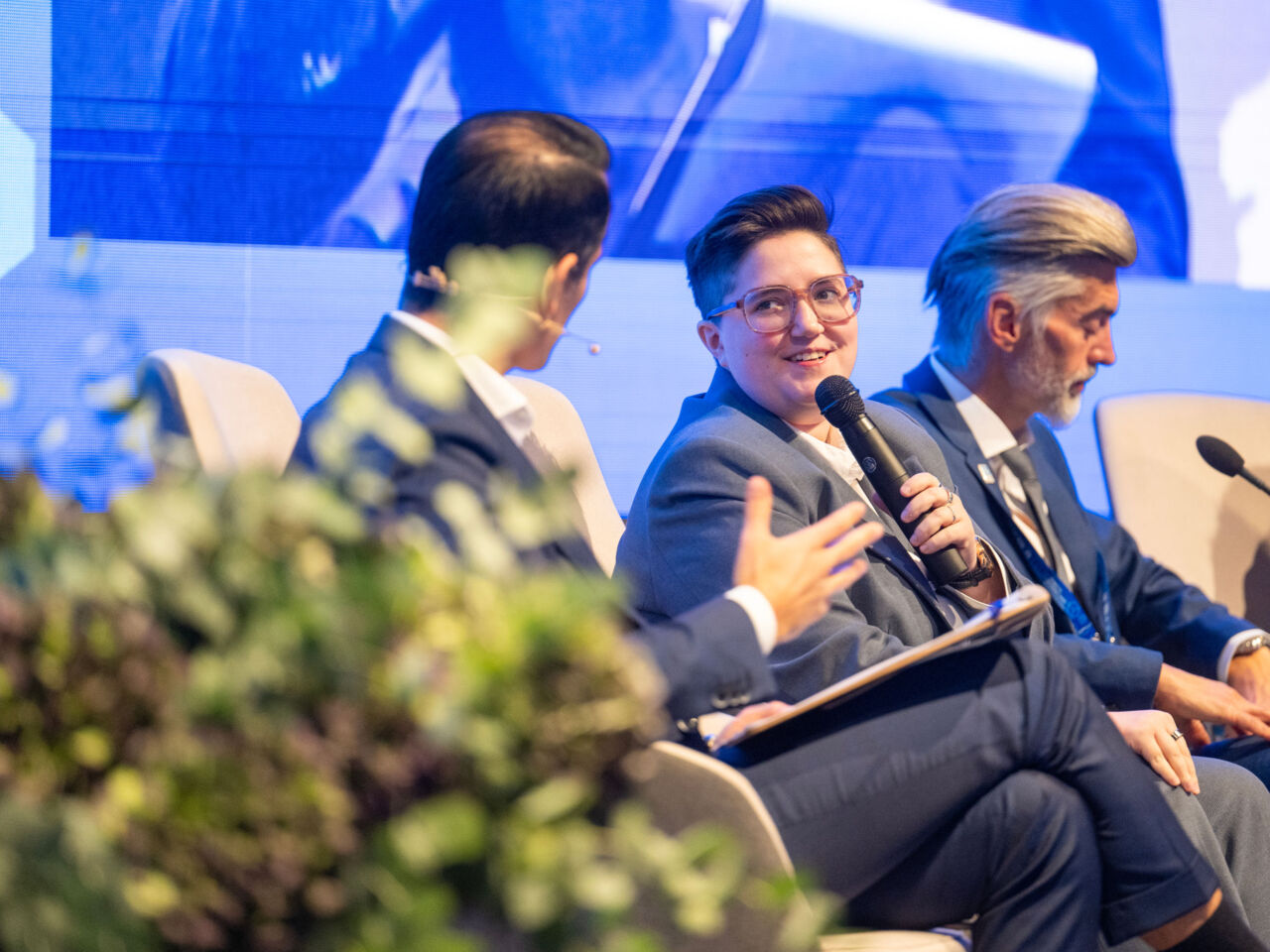15 October 2025
WorldSkills Croatia Conference 2025 unites thought leaders and youth around the future of TVET
Day two of WorldSkills General Assembly 2025 provided a platform for international discussion and best practice at WorldSkills Croatia Conference 2025.

The second day of WorldSkills General Assembly 2025 was a full day of programming for the WorldSkills Croatia Conference 2025, which saw international organizations, policymakers, industry leaders, educators, and youth meet to help shape the future of skills development.
The conference was hosted by WorldSkills Croatia and the Agency of VET and Adult Education (ASOO), with support from Croatia’s Ministry of Science, Education and Youth. Under the banner of “Skills (R)Evolution - Empowering the future with Skills Development”, it featured over 20 speakers and panelists and drew a crowd of nearly 300 delegates.
The opening ceremony began with words of welcome from Croatian dignitaries, Mile Živčić, Director, Agency for VET and Adult Education, Croatia, Mate Franković, Mayor, City of Dubrovnik, and Dr Radovan Fuchs, Minister of Science, Education and Youth, Croatia.
Mile Živčić described how the event coincided with a pivotal moment for TVET in his country. He said, “This Conference is held in a special year for us. We have conducted the biggest reform ever with 140 new programmes being introduced. At the same time we celebrate 15 years of being part of WorldSkills. Let us use this next day to exchange ideas, inspire each other, and build new partnerships!”
Dr Radovan Fuchs delivered a rallying cry to assembled delegates saying, “The changes of today demand that we are adaptable and responsible. TVET gives us the power to shape our own future. By working together – governments, employers, educators, and international partners – we can make skills the true global currency of the world. Excellence in skills is excellence in life.”
The morning keynote featured Perttu Pölönen, a futurist and author from Finland, who spoke about TVET in a disruptive world. He explored how human skills and values will be vital in the future as a balance to technological advancements. “Effort is a crucial part of being a human being,” he said. “If we get rid of the effort, because of AI, we might get rid of the purpose as well. Technology makes things easy, but does it also mean we lower our standards?”
The opening plenary panel explored how global mega-trends impact TVET and skills mobility and how the international skills community can bridge the gap between education and industry demands.
Nurit Davidowicz, WorldSkills Champions Trust representative for Europe, shared what she thought was the biggest challenge for employers. She said, “They need to motivate young people. I often ask myself, in a world like this full of crises, why do I even do it? But I know, with my mechatronic skills, I am making factories more efficient, so they use less energy. Employers need to show that the work that they offer creates social impact for the future.”
Manuela Geleng, Director for Jobs and Skills, Directorate-General for Employment, Social Affairs and Inclusion, European Commission expanded on the challenges across Europe. She said, “Most of our labour shortages are in TVET professions. That tells you how important skills are. The challenge is attractiveness. We need to make the professions of the future attractive and accessible to all and ensure skills can move across borders.”

Participants then dove into specific elements of these topics more deeply in a series of breakout sessions before lunch.
In Breakout Session 1, titled “Supporting technical and vocational skills for the future economy”, the discussion explored the importance of social or “soft” skills, and the role that industry and employers need to play in co-designing future skills systems. Michael Ward, Senior Policy Analyst, Directorate for Education and Skills, OECD, advocated for a “skills-first” approach to hiring saying, “it would lead to a more adaptable workforce.”
In Breakout Session 2, titled “Skills for a circular and green economy: leading the sustainable transition”, panellists showed how competences for circular manufacturing can be developed and gave an overview of the job opportunities in this field. During the panel, LIXIL explained, from a manufacturer’s perspective, how they provide state of the art equipment and materials for best training in plumbing schools in Europe. The conversation looked into gender and concluded that it is not only about adapting TVET institutions but tackling the structural problems at the workplace.
In Breakout Session 3, titled “Quality and attractiveness: building future-ready TVET systems”, panellists shared replicable ideas from Switzerland, the USA, and Croatia, as well as UNIDO’s approach, to transform TVET into a dynamic platform for empowerment, entrepreneurship, and societal impact. We learned that a key to success is relevance and purpose, linking learning with innovation, and competences with opportunities. Chelle Travis, Executive Director of SkillsUSA, shared, “We need to meet students as they are – digital natives. We need to make sure that they see themselves in TVET in YouTube, Instagram, TikTok.”
The afternoon featured inspiring pitches from the five teams selected for BeChangeMaker 2025, the social entrepreneurship training programme powered by WorldSkills and the HP Foundation. After careful deliberation, the judges and audience selected Glovatrix as this year’s winner, a smart AI-based glove that translates sign language into speech.
The day concluded with a plenary exploring how to position skills as a powerful lever to address critical challenges such as economic transformation, innovation, and inclusivity. Moderator Ali Al-Jaberi invited the panel to reflect on how TVET can contribute to socio-economic growth.
Sharon Hague, CEO of Pearson UK, responded saying, “We think this is an incredible moment for TVET. More than $1 trillion is being lost from transitioning businesses yet TVET can help us overcome this by leveraging technology for best effect through education, empowering learners, reducing the burden on educators, and helping us embrace lifelong learning.”
Narmeen Almarzooqi, WorldSkills Champions Trust representative for MENA, advocated for lifelong skills development saying, “We should also celebrate the beauty in the process of learning a skill. Developing a skill will help us grow into better professionals and, more importantly, more competent, resilient people.”
Kenny Muscat, Programme Officer at UNESCO-UNEVOC, emphasized the role of public-private partnerships. He said, “This conference is a great example of how we can come together as public and private organizations, sit down together, and have one voice to move forward a united TVET agenda.”
At the end of the closing plenary, WorldSkills and the United Nations Industrial Development Organization (UNIDO) signed a Joint Declaration to strengthen cooperation in supporting skills development worldwide.
In his closing remarks, Francis Hourant, President of WorldSkills urged delegates to take these discussions and put them into action in their daily work. He said, “We must be bold in our ambitions. We must create a world where skills are recognized as the key to solving the great challenges of our time. We cannot have peace without education. Skills give people dignity, purpose, and the power to create change. WorldSkills was founded on this very idea 75 years ago, and today it is more vital than ever. Each of us carries a responsibility — let us not waste it.”
Follow all the news from WorldSkills General Assembly 2025 and WorldSkills Croatia Conference 2025.